Thursday - February 19, 2004
 Institutional Lies Institutional Lies
Okay, maybe "lies" is a bit strong. The thing is
that I don't understand why they can be so persistent.
My rant now is about the Porsche Club
in particular, but it could be any other human endeavor. Many organizations
develop a story that may or may not have had any basis in reality in the past,
but clearly is no longer true. Nonetheless the story is told, sometimes with a
tenacity that is laced with overwrought
emotion.In this case, the people in
the Porsche club insist that you are less likely to wreck on the race track than
you are in daily driving. I have no idea where this comes from, but if you
point out obvious facts, no matter how politely, you can be confronted with
extremely hostile reactions. I'm not sure why that is, because all (well,
almost all) of the people involved are some of the nicest I've ever
met. Institutional lies are a hint as to
how religions thrive. Institutional lies are a hint as to
how religions thrive.
I'd been through this topic with club members
before and it was very ugly, but tonight while at our monthly happy hour, a new
instructor brought it up again in front of me not realizing how much hatred it
caused in the past. Strangely, even though he didn't know of the animosity it
caused before, he had the same hostile reaction to a polite objection to his
claims.Okay, here's the scenario:
We're there talking about our cars, and a new member is present and being
encouraged to take her brand new boxster out on the track. So far so good. The
track is not only more fun than most other things I've ever done, but you learn
some very valuable skills. Personally, I think anyone with a sports car needs
to get this training.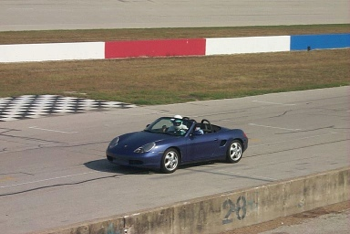 But this new instructor has
transferred to Austin from the Northeast and is by all accounts an accomplished
driver and has recently been certified in our region as an instructor. Joining
our conversation, he volunteered to the new member that the track is the safest
place you could ever drive. This is nonsense on its face, but this is the
institutional lie, and people believe it despite all evidence to the
contrary.I politely suggested that you
can certainly wreck your car on the track and it happens often. In fact, I have
not yet witnessed a weekend at the track where at least one car wasn't damaged,
sometimes quite severely. And here's where the institutional lie gets its
force. Even though he is new to the group and didn't know of past conversations
and hate mail locally on this topic, he quickly raised his voice and used the
"I'm right because I'm talking louder" method of reasoning. Then he quoted some
non-existent statistics that more accidents per mile occur on the highway than
on the track. Raising his voice further, he makes the oft repeated claim that
accidents are "rare" on the track. I decided that I didn't want any part of the
conversation any more and went to chat with
others.Okay, I don't mean to pick on
this guy, he really is a nice guy. But his response is typical. A belief that
is held strongly is not lightly cast aside, no matter the
evidence. But this new instructor has
transferred to Austin from the Northeast and is by all accounts an accomplished
driver and has recently been certified in our region as an instructor. Joining
our conversation, he volunteered to the new member that the track is the safest
place you could ever drive. This is nonsense on its face, but this is the
institutional lie, and people believe it despite all evidence to the
contrary.I politely suggested that you
can certainly wreck your car on the track and it happens often. In fact, I have
not yet witnessed a weekend at the track where at least one car wasn't damaged,
sometimes quite severely. And here's where the institutional lie gets its
force. Even though he is new to the group and didn't know of past conversations
and hate mail locally on this topic, he quickly raised his voice and used the
"I'm right because I'm talking louder" method of reasoning. Then he quoted some
non-existent statistics that more accidents per mile occur on the highway than
on the track. Raising his voice further, he makes the oft repeated claim that
accidents are "rare" on the track. I decided that I didn't want any part of the
conversation any more and went to chat with
others.Okay, I don't mean to pick on
this guy, he really is a nice guy. But his response is typical. A belief that
is held strongly is not lightly cast aside, no matter the
evidence.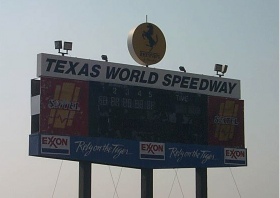 After I left that little circle, a
very nice and reasonable man whom I much admire joined me and we talked about
this. He is much more open minded, yet even with him, he suggested that
accidents that occur are only because the driver is a student who ignored his
instructor's advice, or the instructor failed to give the right advice. It
seemed obvious to me that if the driver doesn't make a mistake, he's less likely
to have an accident, but the reason we're there is to push our skill level.
It's inevitable that some one will exceed their ability at some time. Usually
it results in a spin with no damage, other times aren't so
lucky.Oh, and the first thing everyone
does is accuse me of being resentful for wrecking my car on the track. My
objections are dismissed only because they accuse me of being a bad driver. I
don't claim to be a good driver, but this classic ad hominem attack does nothing
to change the argument except to encourage them to ignore any claims from me
because of it. I could point out that some of our best drivers have totaled
their cars on the track, but I don't like to dignify this deflection of the
facts. After I left that little circle, a
very nice and reasonable man whom I much admire joined me and we talked about
this. He is much more open minded, yet even with him, he suggested that
accidents that occur are only because the driver is a student who ignored his
instructor's advice, or the instructor failed to give the right advice. It
seemed obvious to me that if the driver doesn't make a mistake, he's less likely
to have an accident, but the reason we're there is to push our skill level.
It's inevitable that some one will exceed their ability at some time. Usually
it results in a spin with no damage, other times aren't so
lucky.Oh, and the first thing everyone
does is accuse me of being resentful for wrecking my car on the track. My
objections are dismissed only because they accuse me of being a bad driver. I
don't claim to be a good driver, but this classic ad hominem attack does nothing
to change the argument except to encourage them to ignore any claims from me
because of it. I could point out that some of our best drivers have totaled
their cars on the track, but I don't like to dignify this deflection of the
facts.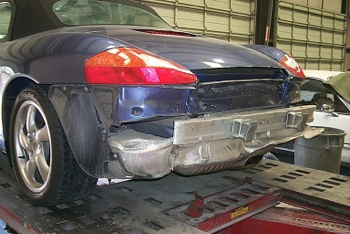 So, let me present my case briefly:
My interest in this issue is only to promote a better attitude towards safety.
From my experience in Marine aviation, I've learned that very dangerous
activities can be done safely, but only by understanding the dangers involved.
Pretending that everything is safe is a recipe for creating the conditions for
someone to stop paying attention to that danger and have a mishap.
Every time I have gone to the track,
either as a driver or just to watch, I have seen at least one car each weekend
receive some structural damage. Sometimes it was major, sometimes just a fender
bender, and once there was a high speed car-on-car collision. Sometimes it was
a new driver, but most times it was a driver in the higher
levels.So why do people argue that
accidents are rare, and that being on the track is safer than being on the
public roads? I'm not really sure, but it's devoutly believed by many, and they
react with anger and shock if anyone suggests
otherwise.And here we're talking about
driving cars. It's not an earth shattering topic. What if we were to discuss
something more important, like someone's most fundamental understanding of how
they conceive of reality and the structure of the universe they live in. If you
think arguing about car wrecks causes illogical and emotional responses, you can
be assured that challenging someone's religious ideas could be down right
dangerous to your health. For this reason, I never do this to someone's face or
even in personal correspondence without extreme trepidation. I pretty much know
better than to do it at all except in mostly impersonal writing such as
this. So, let me present my case briefly:
My interest in this issue is only to promote a better attitude towards safety.
From my experience in Marine aviation, I've learned that very dangerous
activities can be done safely, but only by understanding the dangers involved.
Pretending that everything is safe is a recipe for creating the conditions for
someone to stop paying attention to that danger and have a mishap.
Every time I have gone to the track,
either as a driver or just to watch, I have seen at least one car each weekend
receive some structural damage. Sometimes it was major, sometimes just a fender
bender, and once there was a high speed car-on-car collision. Sometimes it was
a new driver, but most times it was a driver in the higher
levels.So why do people argue that
accidents are rare, and that being on the track is safer than being on the
public roads? I'm not really sure, but it's devoutly believed by many, and they
react with anger and shock if anyone suggests
otherwise.And here we're talking about
driving cars. It's not an earth shattering topic. What if we were to discuss
something more important, like someone's most fundamental understanding of how
they conceive of reality and the structure of the universe they live in. If you
think arguing about car wrecks causes illogical and emotional responses, you can
be assured that challenging someone's religious ideas could be down right
dangerous to your health. For this reason, I never do this to someone's face or
even in personal correspondence without extreme trepidation. I pretty much know
better than to do it at all except in mostly impersonal writing such as
this. 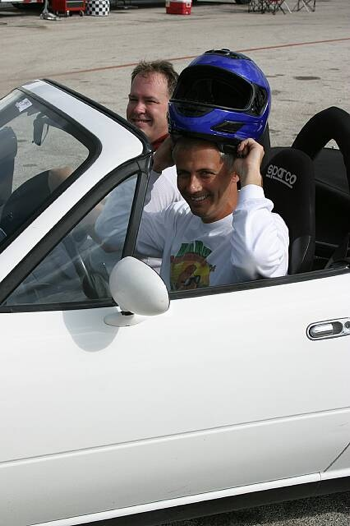 The history of man is filled with
people killing each other over this topic. Politics is filled with religious
bigotry, with people insisting that their god tells them what is best for us
all. Despite that there is no evidence for the existence of a god, despite that
most definitions of a god, especially the Christian god, are down right
illogical, people believe. It doesn't have to make sense, they just believe.
They structure their lives around the institutional lie of their deity, and any
challenge to that lie is a danger to their immediate
lives.The good and well-meaning people
of the Porsche Club of America seem to believe that if they acknowledged the
danger of driving on a race track, that newcomers would be deterred from joining
in. They value newcomers because they keep the club alive and growing, and make
it more fun. Perhaps they are concerned that a more sober look at safety issues
will reveal that it is indeed too dangerous and may result in someone calling
for an end to it. I have no idea. I never want to discourage anyone from
driving on the track. It's fun. But it is dangerous and cars get destroyed and
people can get hurt -- or why else do we always have tow trucks and ambulances
present?The good and well-meaning
people of the Christian churches, and all other religions, believe that
questioning their beliefs could be dangerous to our entire society, and indeed
those who don't accept their make-believe are menaces to good order and civil
behavior. Without our modern recognition of civil rights, non-believers would
be burned at the stake just as they have been in most societies throughout the
entirety of history, all based on a stubborn and non-rational insistence on
institutional lies. The history of man is filled with
people killing each other over this topic. Politics is filled with religious
bigotry, with people insisting that their god tells them what is best for us
all. Despite that there is no evidence for the existence of a god, despite that
most definitions of a god, especially the Christian god, are down right
illogical, people believe. It doesn't have to make sense, they just believe.
They structure their lives around the institutional lie of their deity, and any
challenge to that lie is a danger to their immediate
lives.The good and well-meaning people
of the Porsche Club of America seem to believe that if they acknowledged the
danger of driving on a race track, that newcomers would be deterred from joining
in. They value newcomers because they keep the club alive and growing, and make
it more fun. Perhaps they are concerned that a more sober look at safety issues
will reveal that it is indeed too dangerous and may result in someone calling
for an end to it. I have no idea. I never want to discourage anyone from
driving on the track. It's fun. But it is dangerous and cars get destroyed and
people can get hurt -- or why else do we always have tow trucks and ambulances
present?The good and well-meaning
people of the Christian churches, and all other religions, believe that
questioning their beliefs could be dangerous to our entire society, and indeed
those who don't accept their make-believe are menaces to good order and civil
behavior. Without our modern recognition of civil rights, non-believers would
be burned at the stake just as they have been in most societies throughout the
entirety of history, all based on a stubborn and non-rational insistence on
institutional lies.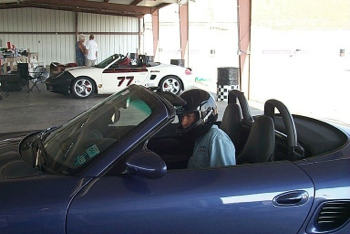
Go Back to the Start, Do Not Collect $200 Send me your two cents
|
|
